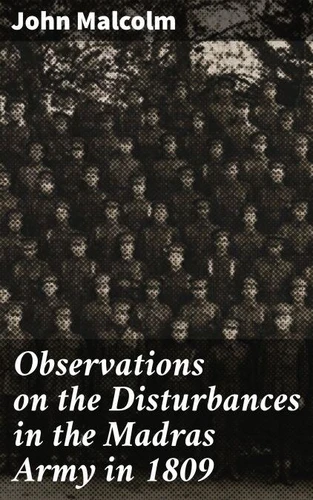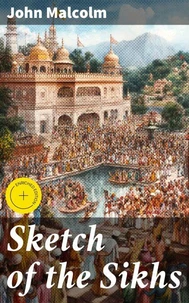Observations on the Disturbances in the Madras Army in 1809. Unraveling Turmoil in the Madras Army: A Historical Analysis
Par :Formats :
Disponible dans votre compte client Decitre ou Furet du Nord dès validation de votre commande. Le format ePub est :
- Compatible avec une lecture sur My Vivlio (smartphone, tablette, ordinateur)
- Compatible avec une lecture sur liseuses Vivlio
- Pour les liseuses autres que Vivlio, vous devez utiliser le logiciel Adobe Digital Edition. Non compatible avec la lecture sur les liseuses Kindle, Remarkable et Sony
 , qui est-ce ?
, qui est-ce ?Notre partenaire de plateforme de lecture numérique où vous retrouverez l'ensemble de vos ebooks gratuitement
Pour en savoir plus sur nos ebooks, consultez notre aide en ligne ici
- Nombre de pages291
- FormatePub
- ISBN406-4-06-615270-3
- EAN4064066152703
- Date de parution18/12/2019
- Protection num.Digital Watermarking
- Taille681 Ko
- Infos supplémentairesepub
- ÉditeurGOOD PRESS
Résumé
In "Observations on the Disturbances in the Madras Army in 1809, " John Malcolm provides a meticulous account of the social and military upheavals that plagued the British forces in India during this tumultuous period. Rich in detail, the text combines elements of historical narrative and political analysis, capturing the complexities of colonial military dynamics. Malcolm's prose is both vivid and precise, reflecting the heightened tensions within the ranks and the broader implications for British imperial policy in India.
His firsthand insights, drawn from his experiences as a soldier and diplomat, lend authenticity to his observations, situating the book firmly within the tradition of contemporary military history writing. John Malcolm, a distinguished soldier and diplomat, served as a key figure in British India during the early 19th century, and his deep engagement with the region informed his understanding of its multifaceted society.
His experiences, coupled with his role in the administration, shaped his perspective on the delicate balance between military might and cultural nuance. Malcolm's direct involvement in the events he recounts extends beyond mere observation; it suggests a profound concern for the welfare of both the military personnel and the indigenous populations affected by colonial rule. This book is essential for anyone looking to understand the intricate relationship between colonial power and military discipline in 19th-century India.
Scholars, historians, and general readers alike will find Malcolm's analysis compelling and illuminating, offering a nuanced perspective on the challenges faced by the British Empire in maintaining its military coherence in a foreign land.
His firsthand insights, drawn from his experiences as a soldier and diplomat, lend authenticity to his observations, situating the book firmly within the tradition of contemporary military history writing. John Malcolm, a distinguished soldier and diplomat, served as a key figure in British India during the early 19th century, and his deep engagement with the region informed his understanding of its multifaceted society.
His experiences, coupled with his role in the administration, shaped his perspective on the delicate balance between military might and cultural nuance. Malcolm's direct involvement in the events he recounts extends beyond mere observation; it suggests a profound concern for the welfare of both the military personnel and the indigenous populations affected by colonial rule. This book is essential for anyone looking to understand the intricate relationship between colonial power and military discipline in 19th-century India.
Scholars, historians, and general readers alike will find Malcolm's analysis compelling and illuminating, offering a nuanced perspective on the challenges faced by the British Empire in maintaining its military coherence in a foreign land.
In "Observations on the Disturbances in the Madras Army in 1809, " John Malcolm provides a meticulous account of the social and military upheavals that plagued the British forces in India during this tumultuous period. Rich in detail, the text combines elements of historical narrative and political analysis, capturing the complexities of colonial military dynamics. Malcolm's prose is both vivid and precise, reflecting the heightened tensions within the ranks and the broader implications for British imperial policy in India.
His firsthand insights, drawn from his experiences as a soldier and diplomat, lend authenticity to his observations, situating the book firmly within the tradition of contemporary military history writing. John Malcolm, a distinguished soldier and diplomat, served as a key figure in British India during the early 19th century, and his deep engagement with the region informed his understanding of its multifaceted society.
His experiences, coupled with his role in the administration, shaped his perspective on the delicate balance between military might and cultural nuance. Malcolm's direct involvement in the events he recounts extends beyond mere observation; it suggests a profound concern for the welfare of both the military personnel and the indigenous populations affected by colonial rule. This book is essential for anyone looking to understand the intricate relationship between colonial power and military discipline in 19th-century India.
Scholars, historians, and general readers alike will find Malcolm's analysis compelling and illuminating, offering a nuanced perspective on the challenges faced by the British Empire in maintaining its military coherence in a foreign land.
His firsthand insights, drawn from his experiences as a soldier and diplomat, lend authenticity to his observations, situating the book firmly within the tradition of contemporary military history writing. John Malcolm, a distinguished soldier and diplomat, served as a key figure in British India during the early 19th century, and his deep engagement with the region informed his understanding of its multifaceted society.
His experiences, coupled with his role in the administration, shaped his perspective on the delicate balance between military might and cultural nuance. Malcolm's direct involvement in the events he recounts extends beyond mere observation; it suggests a profound concern for the welfare of both the military personnel and the indigenous populations affected by colonial rule. This book is essential for anyone looking to understand the intricate relationship between colonial power and military discipline in 19th-century India.
Scholars, historians, and general readers alike will find Malcolm's analysis compelling and illuminating, offering a nuanced perspective on the challenges faced by the British Empire in maintaining its military coherence in a foreign land.





